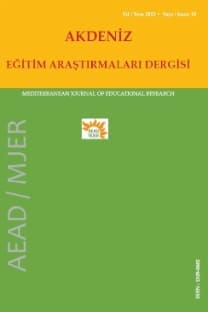Öğretmen ve Ailelerin İstenmeyen Öğrenci Davranışlarına İlişkin Algıları
Bu çalışmanın amacı, aileler ve öğretmenlerin sınıflarda görülen istenmeyen davranışları nasıl algıladıklarını belirlemektir. Çalışma Erzurum ilinde 6 ilköğretim okulunda görev yapan 232 öğretmen ve çocukları bu okullarda öğrenim gören ebeveynler üzerinde gerçekleştirilmiştir. Verilerin elde edilmesinde anket formu kullanılmıştır. Verilerin analizi sonucunda aile ve öğretmenlerin istenmeyen davranışlara ilişkin algılarının farklılıklar gösterdiği belirlenmiştir.
The Perceptions of the Parents and Teachers Towards Student Misbehaviors
In every education level, it is one of the hardest duties and sources of depression of the teachers, to deal with the undesired student behaviors. The aim of this study is to determine how the parents and the teachers comprehend the undesirable behaviors as observed in the classrooms. It was conducted on 232 teachers serving in 6 primary schools in Erzurum province and on the parents whose children attend these schools. A survey form was used in order to obtain the data. It is collected, as a result of the analysis of the data that the conception of the teachers and the parents in terms of the undesirable behaviors differed.
___
Atıcı, M., & Merry, R. (2001). Misbehaviour in british and turkish primary classrooms'. Pastoral Care, 19 (2), 32-39.Atıcı, M. (2007). A small-scale study on student teachers' perceptions of classroom management and methods for dealing with misbehaviour, Emotional and Behavioural Difficulties, 12 (1), 15-27.
Başar, H. (2008). Sınıf yönetimi. Ankara: Anı yayıncılık.
Başaran, H.(1994). Sınıf yönetimi. Ankara: Pegem yayıncılık.
Borg, M. (1998). Secondary school teachers' perception of pupils' undesirable behaviours. British Journal of Educational Psychology, 68,67-79.
Boyacı, A. (2008). Sorun davranışları yönetmek, (ed: M. Çelikten), Yapılandırman. yaklaşıma göre sınıf yönetimi (s. 210-253). Ankara: Anı yayıncılık.
Cangelosi, J. S. (2000). Classroom management strategies. Newyork: John wiley and Sons. Inc.
Celep, C. (2008). Sınıf yönetiminde kuram ve uygulama. Ankara: Pegem yayıncılık.
Çağlar, Ç. (2008). Sınıf yönetimini etkileyen faktörler: yamlandırmacı yaklaşıma göre Sınıf Yönetimi. Ankara: Anı Yayıncılık.
Ding, M., Li, Y., Li, X., & Kulm, G. (2008). Chinese teachers' perceptions of students' classroom misbehaviour. Educational Psychology, 28 (3), 305-324.
Erden, M. (2005). Sınıf yönetimi. İstanbul: Psino Yayınevi.
Essex, N. L. (2002). Ten costly mistakes in disciplining. Education And The Law, (14), 167-172.
Evertson, CM., Emmer, E.T., & Worshan, M.E. (2006). Classroom management for elementary teacliers (7th ed.). New York: Pearson Education
Galton, M.,&Türnüklü, A.(2001). Students' misbehaviours in Turkish and English primary classrooms. Educational Studies,! 7 (3), 291-305.
Hancock, R. (1998). Building home-school liaison into classroom practice: a need to understand the nature of a teacher's working day. British Educational Research Journal, 24 (4), 399-414.
Hofman, R.H.;Hofman, W. H. A.&Guldemond, H. (2003). Effective families, peers, and schools-A configuration approach. Educational Research and Evaluation, 9 (3), 213-237.
Houghton, S., Wheldall, K., & Merrett, F. (1988). Classroom behaviour problems which secondary school teachers say they find most troublesome. British Educational Research journal, (14), 297-312.
Infantino, J.,& Little, E. (2005). Students' perceptions of classroom behaviour problems and the effectiveness of different disciplinary methods. Educational Psychology, 25 (5), 491-508.
Jones, V. F., & Jones, L. S. (2001). Compreliensive classroom management. Allyn and Bacon.
Kokkinos, C. M., Panayiotou, G.,&Davazoglou, A. M. (2004). Perceived seriousness of pupils'. Educational Psychology, 24 (1), 109-121.
Kulinna, P. H., Cothran, D., &Regualos, R. (2003). Development of an Instrument to Measure Student Disruptive Behavior. Measurement In Physical Education And Exercise Science, 7 (1), 25-41.
Lawrence, J., Steed, D., & Young, P. Monitoring teachers' reports of incidents of disruptive behaviour in two secondary schools: Multidisciplinary research and intervention. Educational (9), 81-91.
Lee, V. E., Burkam, D. T., Zimiles, H., & Ladewski, B. (1994).Family structure and its effect on behavioral and emotional problems in young adolescents. Journal of Research on Adolescence, 4 (3), 405-437.
Little, E. (2005). Secondary school teachers' perceptions of students' problem behaviours. Educational Psychology, 25, 369-377.
Mcguinness, J. (1993) Teachers, Pupils and Behaviour: A Managerial Approach. London: Cassell.
Meyers, S. A. (2003).Strategies to prevent and reduce conflict in college classrooms. College Teaching, 51 (3), 94-98.
Mitchem, K.J. (2005). Be Proactive: Including students with challenging behavior in your classroom. Intervention in School and Clinic. 40 (3), 188-191.
Passy, R. (2005). Family values and primary schools: an investigation into family-related education. British Educational Research Journal, 31(6), 723-736
Powel, R. R., McLaughlin, H. J.,Savage, T. V.,&Zehm, S.(2001).Classroom Management: Perspectives on the Social Curriculum. New Jersey: Merrill Prentice Hall.
Ravet, J. (2007). Making sense of disengagement in the primary classroom: a study of pupil, teacher and parent perceptions. Research Papers in Education, 22 (3), 333-362
Romi, S., & Freund, M.(1999). Teachers', students' and parents' attitudes towards disruptive behaviour problems in high school: a case study. Educational Psychology, 19 (1), 53-70.
Shaw, J. M., & Scott, W. (1991). Influence of parent discipline style on delinquent behavior: themediating role of control orientation. Australian Journal of Psychology,(43),61-67.
Spraque, J.,&Golly, A. (2005). Building positive beliavior support in schools. Longmont: SoprisWest.
Stephens, P., Kyriacou, C, & Tonnessen, F. E. (2005). Student teachers' views of pupil misbehaviour in classrooms:A Norwegian and an English setting. Scandinavian Journal of Educational Research, 49 (2), 203-216.
Stuart, H. (1994). Teachers' perceptions of student behaviours: A study of NSW secondary teachers' attitudes. Educational Psychology, 14 (2).
Taş, A. (2005). Sınıf Yönetimini Etkileyen Faktörler. (ed:H. Kıran), Etkili Sınıf Yönetimi. Ankara: Anı yayıncılık.
Vuchinich, S., Bank, L.,&Patterson, G.(1992). Parenting, peers, and the stability of antisocial behavior in pre-adolescent boys. Developmental Psychology (28), 510-521.
Weishew, N. L., &Peng, S. (1993) .Variables predicting students' problem behaviours. Journal ofEducatio nal Research, 87 (1), 5-17.
- ISSN: 1309-0682
- Yayın Aralığı: Yılda 4 Sayı
- Başlangıç: 2008
- Yayıncı: Tayfun Taşbilek
